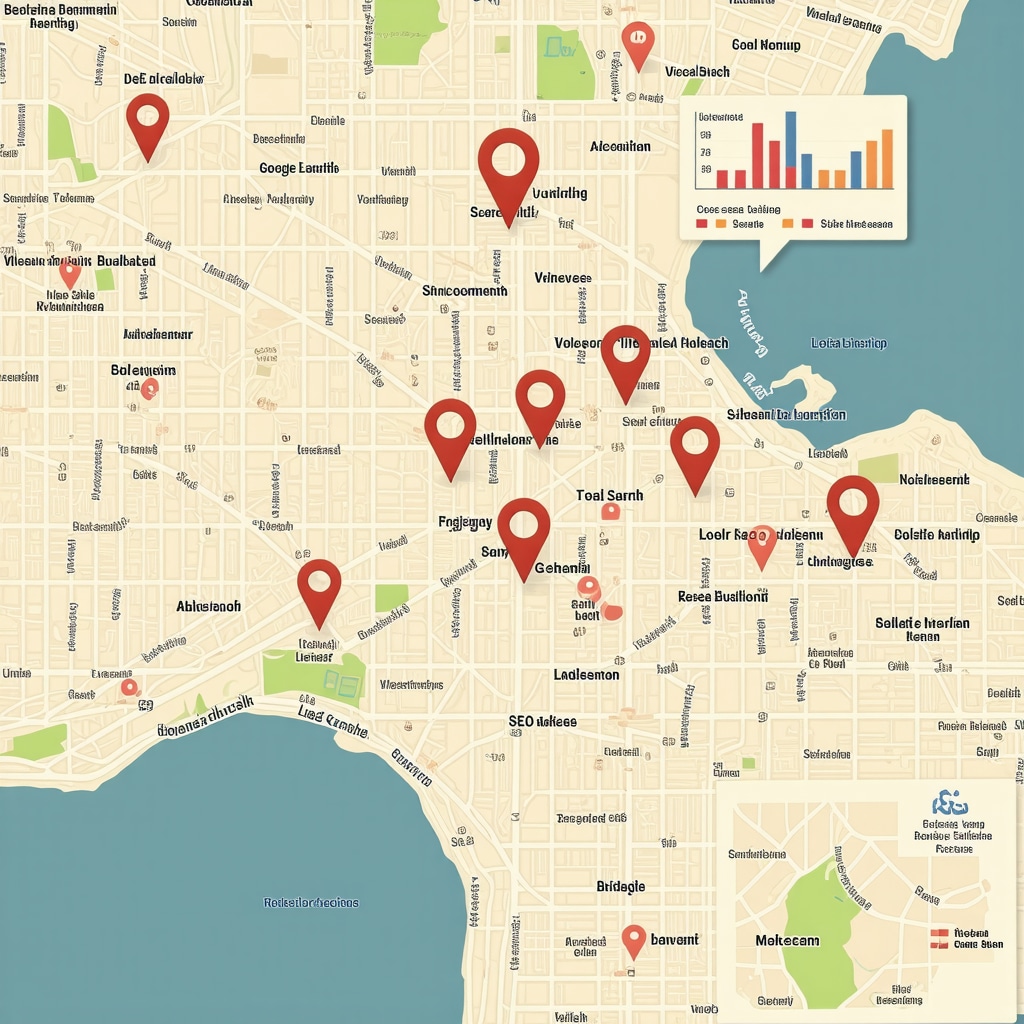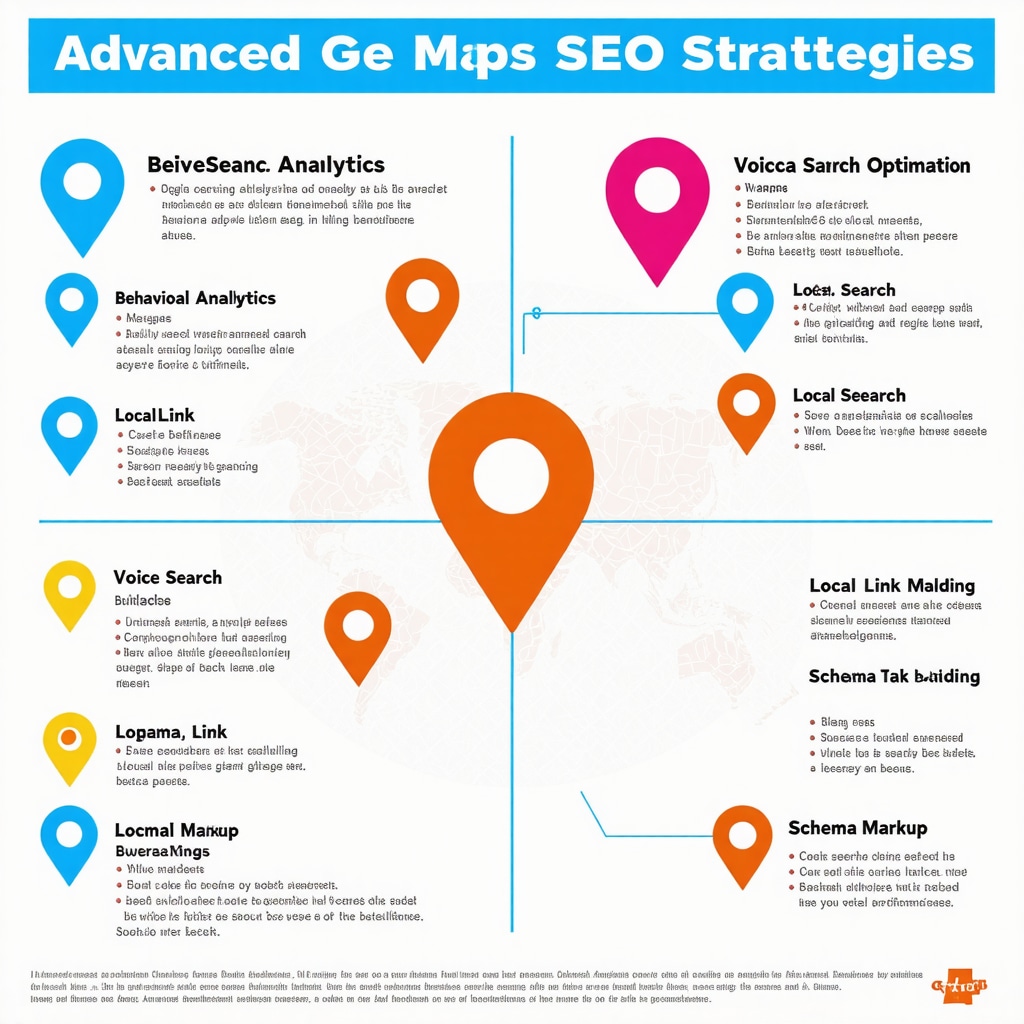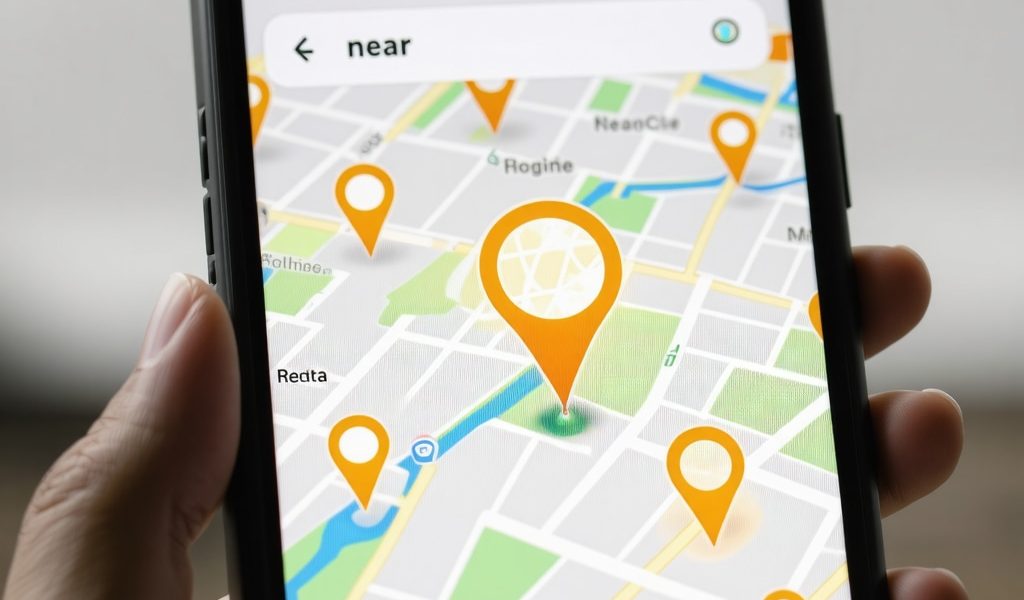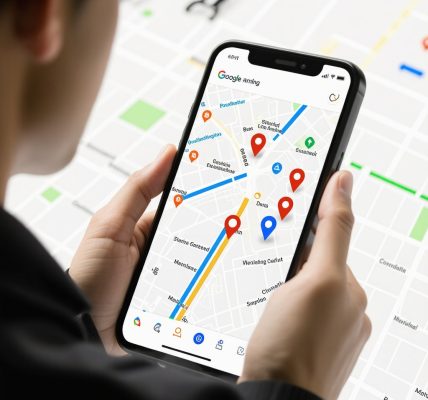Unlocking the Power of “Near Me” Searches: Why Google Maps SEO Is a Game-Changer
In today’s hyper-connected world, consumers increasingly rely on Google Maps to find services and businesses that are conveniently located nearby. Optimizing for “near me” searches is not merely a trend; it’s an essential strategy for local businesses aiming to capture relevant, high-intent traffic. But what sets apart a thriving Google Maps listing from one lost in the local digital noise? The answer lies in mastering Google Maps SEO — a nuanced blend of technical finesse, strategic content, and local engagement that catapults your business into the coveted local 3-pack.
Geo-Targeted Keywords: The Secret Ingredient to Near Me Search Success
Using geo-targeted and long-tail keywords naturally within your Google Business Profile and website content is critical. Instead of generic phrases like “plumber,” incorporate specific variations such as “emergency plumber near me” or “best plumber in [neighborhood].” This approach aligns your listing with user intent, enhancing relevance in Google’s algorithm and improving your chances to appear prominently in local map packs. For in-depth keyword strategies, explore expert insights on crafting powerful Google Business keyword strategies.
Engagement Signals That Elevate Your Google Maps Ranking
Google’s ranking algorithm for local search heavily weighs engagement metrics: frequent reviews, Q&A responsiveness, and up-to-date photos. Encouraging customers to leave detailed, positive reviews not only builds social proof but also sends strong trust signals to Google. Regularly updating your profile with high-quality images related to your services and local area further enriches user experience and boosts ranking potential. Detailed guidance on review generation can be found in best practices for GMB review generation.
How Does Google Determine Which Businesses Appear in ‘Near Me’ Searches?
Google evaluates proximity, relevance, and prominence to decide which businesses surface in “near me” searches. Proximity refers to the physical distance between the searcher and your business location. Relevance measures how well your business matches the search query, influenced by keyword optimization and business categories. Prominence considers the overall reputation, including reviews, backlinks, and citations across the web. Understanding this triad empowers businesses to tailor their local SEO strategies effectively.
Leveraging Citations and Local Listings for Authority Building
Consistent citations across authoritative local directories reinforce your business’s legitimacy. Platforms like Yelp, TripAdvisor, and industry-specific directories should feature your accurate NAP (Name, Address, Phone Number) information. This consistency strengthens Google’s trust in your listing and improves local rankings. Discover expert citation management tactics at expert GMB citation services.
Practical Tip: Regularly Update Your Google Business Profile to Stay Ahead
Local SEO is dynamic; stagnant profiles lose traction. Regularly post updates, special offers, and events to keep your audience engaged and signal activity to Google. This ongoing optimization ensures your business remains visible and competitive in local map searches year-round. For a comprehensive approach, see how to update your Google Business Profile for maximum impact.
Ready to elevate your local visibility and dominate “near me” searches? Share your experiences with Google Maps SEO below or explore our in-depth guides to master local optimization strategies.
Authoritative source for local SEO fundamentals: Moz’s Definitive Guide to Local SEO offers comprehensive, expert-verified insights into optimizing for local search success.
Harnessing Structured Data Markup for Enhanced Local Search Visibility
Implementing structured data markup, particularly Schema.org’s LocalBusiness schema, on your website is a powerful strategy to help search engines better understand your business details. This semantic markup communicates critical information such as business name, address, phone number, operating hours, and geo-coordinates directly to Google. When combined with a fully optimized Google Business Profile, structured data can amplify your chances of appearing prominently in local search results and the coveted Google Maps 3-pack. For those unfamiliar, step-by-step guides on Google Business Profile optimization effectively complement your markup efforts.
Why Are User-Generated Content and Local Community Engagement Critical for Google Maps SEO?
Google increasingly values authentic user-generated content (UGC) such as reviews, photos, and Q&A interactions on your Google Business Profile. Beyond volume, the quality and recency of this content play pivotal roles. Engaging with your community by responding promptly to reviews and questions fosters trust, signals active management to Google, and encourages further interaction. Additionally, participating in local events or sponsoring neighborhood activities can generate organic backlinks and citations, boosting your prominence. Learn more about harnessing review generation best practices to maximize engagement benefits.
How Can Advanced Citation Management Propel Your Local SEO Strategy Beyond Basics?
Effective citation management transcends mere NAP consistency; it involves strategic placement on high-authority, niche-specific directories and continuous monitoring to prevent data discrepancies. Utilizing tools and services specialized in citation auditing ensures your business information remains accurate across the web, which is vital for Google’s trust signals. Furthermore, leveraging citations in partnership with local influencer collaborations can enhance your business’s prominence and relevance. For expert assistance, explore expert GMB citation services designed to elevate your local search authority.
Leveraging Google Posts and Offers to Drive Immediate Local Traffic
Google Posts enable businesses to share timely updates, promotions, and events directly on their Google Business Profile. This feature not only engages users but also improves your profile’s freshness, a factor that Google favors in ranking. Crafting compelling offers or limited-time deals can entice nearby customers conducting “near me” searches to choose your business over competitors. Regularly incorporating Google Posts into your local SEO strategy ensures you remain top-of-mind and competitive in your local market. Discover tactical approaches in our guide on how to update your Google Business Profile for maximum impact.
Understanding the Impact of Mobile Optimization on Local Search Success
With the majority of “near me” queries occurring on mobile devices, ensuring your website and Google Business Profile are fully optimized for mobile is non-negotiable. Fast loading times, intuitive navigation, and mobile-friendly content significantly enhance user experience, reducing bounce rates and increasing engagement signals that Google rewards. Integrating click-to-call buttons and easy-to-find directions further streamlines the customer journey from search to conversion. For comprehensive tactics, see comprehensive local SEO optimization techniques.
What emerging trends in Google Maps SEO should local businesses watch to maintain a competitive edge? As voice search and AI-driven local intent evolve, businesses must adapt by refining their conversational keyword strategies and embracing new content formats. Staying informed through authoritative sources like Moz’s Definitive Guide to Local SEO ensures you leverage cutting-edge tactics effectively.
We invite you to share your experiences or questions about Google Maps SEO below. For those eager to dive deeper, explore our in-depth resources on mastering Google Business SEO and fastest ways to rank your Google Business Profile to accelerate your local search success.
Deep Dive into the Role of Behavioral Analytics in Google Maps SEO
Beyond traditional ranking factors like citations and reviews, behavioral analytics are becoming indispensable in shaping effective Google Maps SEO strategies. Metrics such as click-through rates (CTR), user dwell time on your profile, and direct requests for directions provide Google with nuanced signals about your business’s relevance and user satisfaction. Businesses that analyze these engagement patterns can fine-tune their profiles and website content to better meet user needs, thereby increasing their prominence in local search results.
Employing tools such as Google Analytics and heatmaps on your website allows for monitoring how visitors from Google Maps listings interact with your site, identifying bottlenecks, and optimizing conversion paths. This data-driven approach ensures your local SEO is not just about visibility but also about delivering superior user experiences that convert searches into customers.
How Can Behavioral Signals Influence Google Maps Ranking Algorithms?
Google incorporates behavioral signals as part of its ranking algorithm to assess the quality and relevance of local business listings. When users frequently click on your listing, spend time exploring your photos and posts, or engage with your Q&A, it informs Google that your business is valuable and pertinent to the search query. Conversely, high bounce rates or low interaction can negatively affect local rankings. Therefore, optimizing for positive behavioral engagement is critical for sustained Google Maps SEO success.
Integrating Voice Search Optimization with Google Maps SEO for the Next-Gen Consumer
With the proliferation of voice-activated devices, voice search optimization is no longer optional but essential for local businesses. Voice queries tend to be more conversational and specific, often including phrases like “near me” or “open now.” Incorporating natural language keywords and FAQs into your Google Business Profile and website content can capture this growing segment of local search traffic.
Moreover, structured data markup tailored for voice search can enhance your chances of being featured as a direct answer or in voice assistant responses, thereby increasing your visibility. Techniques such as optimizing for featured snippets and using schema markup for services and products can synergize with Google Maps SEO efforts to capture voice-driven local intent effectively.
Leveraging Advanced Local Link Building Tactics to Boost Google Maps Authority
While citations are foundational, strategic local link building can elevate your Google Maps authority to new heights. Partnering with local bloggers, chambers of commerce, and community websites to secure backlinks from trusted sources enhances your domain authority and trustworthiness in Google’s eyes. Focus on acquiring links that are contextually relevant and geographically proximate to your business to maximize local SEO benefits.
Additionally, creating locally-focused, high-quality content such as neighborhood guides, event recaps, or case studies can naturally attract backlinks and shares, further strengthening your online presence. Employing these sophisticated link-building strategies complements your Google Business Profile optimization, creating a robust ecosystem that supports higher rankings.

What Are the Best Practices for Implementing Schema Markup to Maximize Google Maps SEO Impact?
Implementing schema markup effectively requires a comprehensive approach: start by selecting the most specific LocalBusiness type that matches your industry, such as Restaurant, MedicalClinic, or Plumber. Include essential properties like address, telephone, openingHours, and geo coordinates. Validate your markup using Google’s Rich Results Test tool to ensure compatibility.
Moreover, regularly updating schema data to reflect changes in business hours, special events, or service offerings keeps search engines accurately informed. Integrating schema with your Google Business Profile data creates coherence that search engines reward with enhanced local search visibility.
For detailed technical guidelines and advanced schema implementation strategies, consult Google’s official documentation on LocalBusiness structured data.
Ready to revolutionize your local search presence with these expert Google Maps SEO tactics? Dive deeper into our comprehensive resources and start transforming your local visibility today.
Decoding the Influence of Behavioral Analytics on Local Search Outcomes
Modern Google Maps SEO transcends foundational tactics by integrating behavioral analytics to refine local search performance. Analyzing metrics such as click-through rates, user dwell time, and direct actions like requests for directions offers granular insights into how users engage with your business profile. These engagement indicators provide Google with compelling evidence of your business’s relevance and user satisfaction, ultimately impacting your local search rankings.
Employing advanced tools such as Google Analytics and heatmapping software enables businesses to visualize user interactions on their websites originating from Google Maps listings. This data-driven approach allows for continuous optimization of conversion funnels, ensuring that local SEO efforts translate into tangible customer acquisition.
How Can Behavioral Data Be Leveraged to Optimize Google Maps SEO Performance?
Behavioral data informs which elements of your Google Business Profile resonate most effectively with users. For instance, high engagement with photos or frequent clicks on specific service categories highlight areas to emphasize in content and marketing. Monitoring bounce rates and session durations can help identify and rectify user experience issues, thereby enhancing profile appeal and boosting rankings through improved user satisfaction signals.
Integrating Conversational AI and Voice Search Optimization for Local Discovery
As voice-activated assistants become ubiquitous, optimizing for conversational queries is imperative. Voice searches often feature natural language and localized intent, such as “Where can I find a 24/7 pharmacy near me?” Incorporating comprehensive FAQs, natural language keywords, and schema markup tailored for voice search can increase the likelihood of your business being surfaced in voice assistant responses.
This synergy between voice search optimization and Google Maps SEO can unlock a competitive advantage by capturing high-intent traffic from mobile and smart device users. Advanced techniques include leveraging AI-generated content to continuously update and expand your local relevance footprint.
Strategic Local Link Building: Beyond Citations to Community Authority
Elevating Google Maps authority requires sophisticated link-building strategies that prioritize quality and locality. Collaborating with local influencers, sponsoring community events, and contributing expert content to geographically relevant platforms can yield authoritative backlinks that reinforce your business’s prominence.
Creating resource-rich content such as neighborhood guides, case studies, and event highlights further attracts organic links and social shares. This holistic approach enhances domain authority and complements your Google Business Profile optimization, driving sustained improvements in local search visibility.

What Are the Most Effective Methods for Implementing and Maintaining Schema Markup in Dynamic Local Business Environments?
Implementing schema markup requires selecting the precise LocalBusiness subtype that aligns with your industry and including all critical properties like address, telephone, openingHours, and geo. Maintaining schema accuracy involves regular audits and updates to reflect operational changes, special offers, or new services.
Utilizing automated validation tools such as Google’s Rich Results Test and Schema.org validators ensures markup integrity. Synchronizing schema data with your Google Business Profile fosters consistency, which search engines reward with enhanced local search features and improved rankings.
For authoritative technical guidance, consult Google’s official LocalBusiness schema documentation.
Harness these advanced Google Maps SEO strategies to elevate your local search dominance. Explore our expert resources and start implementing today for measurable growth.
Frequently Asked Questions (FAQ)
What exactly are “near me” searches and why are they important for local businesses?
“Near me” searches are location-based queries where users seek products or services close to their current location, such as “coffee shop near me” or “emergency plumber near me.” These searches reflect high purchase intent because users want immediate or convenient solutions. For local businesses, optimizing for these queries through Google Maps SEO captures this intent-driven traffic, significantly increasing footfall and conversions.
How does Google determine which businesses appear in the local 3-pack for “near me” searches?
Google uses a combination of proximity (distance to the searcher), relevance (how well your business matches the query based on categories and keywords), and prominence (overall reputation including reviews, citations, and backlinks). Businesses that excel across all three are more likely to rank in the local 3-pack, gaining premium visibility on search results and maps.
What role do reviews and user engagement play in Google Maps SEO?
Reviews act as social proof and influence both user decisions and Google’s ranking algorithm. Frequent, positive, and detailed reviews boost prominence and trustworthiness. Moreover, active engagement—responding to reviews and Q&A—signals to Google that your profile is well-maintained and customer-focused, improving local search rankings.
How can structured data markup enhance my Google Maps SEO?
Structured data markup using Schema.org’s LocalBusiness schema helps search engines better understand your business information like address, hours, and services. This enhanced understanding can lead to rich snippets in search results and improve your chances of appearing prominently in local map packs. Regularly updating and validating your markup ensures accuracy and maximizes SEO benefits.
Why is mobile optimization critical for local search success?
Most “near me” searches happen on mobile devices, making mobile optimization essential. A fast-loading, easy-to-navigate mobile site with click-to-call buttons and integrated maps enhances user experience, reducing bounce rates and encouraging conversions. Google rewards mobile-friendly sites with better rankings, especially for local queries.
What advanced tactics can I use beyond citations to boost my Google Maps authority?
Beyond ensuring consistent citations, advanced tactics include building local backlinks from community websites, collaborating with local influencers, and creating high-quality localized content. These strategies increase domain authority and local relevance, enhancing your Google Maps ranking and overall online presence.
How do behavioral analytics impact my Google Maps SEO strategy?
Behavioral analytics such as click-through rates, dwell time on your profile, and direction requests provide Google with signals about your listing’s relevance and user satisfaction. Monitoring these metrics allows you to optimize your profile and website content to better meet user expectations, which can improve your ranking in local search results.
How can optimizing for voice search improve my local SEO?
Voice searches are conversational and often include phrases like “near me” or “open now.” Optimizing your content with natural language keywords, FAQs, and structured data tailored for voice assistants increases the likelihood your business is featured in voice search results, capturing a growing segment of local traffic.
How often should I update my Google Business Profile to maximize visibility?
Regular updates such as posting offers, events, photos, and responding to reviews help maintain profile freshness, which Google favors. Continuous activity signals that your business is active and engaged, improving your chances of ranking well in local search and Google Maps.
What tools can help me monitor and improve my Google Maps SEO performance?
Tools like Google Analytics, Google Search Console, and heatmapping software provide insights into user behavior from local listings. Citation management platforms help maintain data consistency, while review monitoring tools assist in managing customer feedback. Leveraging these tools enables data-driven optimization of your local SEO strategy.
Trusted External Sources
- Moz’s Definitive Guide to Local SEO: A comprehensive resource offering expert-verified insights on local SEO fundamentals, including detailed strategies for optimizing Google Business Profiles and local search rankings.
- Google’s Official Structured Data Documentation: Authoritative technical guidelines on implementing and maintaining LocalBusiness schema markup to enhance local search visibility and rich results.
- BrightLocal Local Consumer Review Survey: Provides empirical data on the impact of online reviews and customer engagement on local search behavior and business credibility.
- Search Engine Journal Local SEO Section: Industry-leading articles and case studies covering the latest trends, tactics, and algorithm updates affecting Google Maps SEO and local search optimization.
- Google Analytics Help Center: Offers detailed instructions on leveraging behavioral analytics to track user engagement and optimize conversion funnels originating from local search traffic.
Conclusion
Mastering Google Maps SEO is indispensable for local businesses aiming to dominate “near me” searches and secure high-intent customers. By integrating geo-targeted keywords, maintaining consistent citations, engaging actively with reviews, and leveraging advanced strategies like structured data markup and behavioral analytics, you can significantly boost your local search prominence. Mobile optimization and voice search readiness further future-proof your local visibility in an evolving search landscape.
Ultimately, a dynamic, data-driven, and community-engaged approach to Google Maps SEO transforms your online presence into a powerful local growth engine. We encourage you to apply these expert insights, share your experiences, and explore related advanced resources to stay ahead in local search success.



